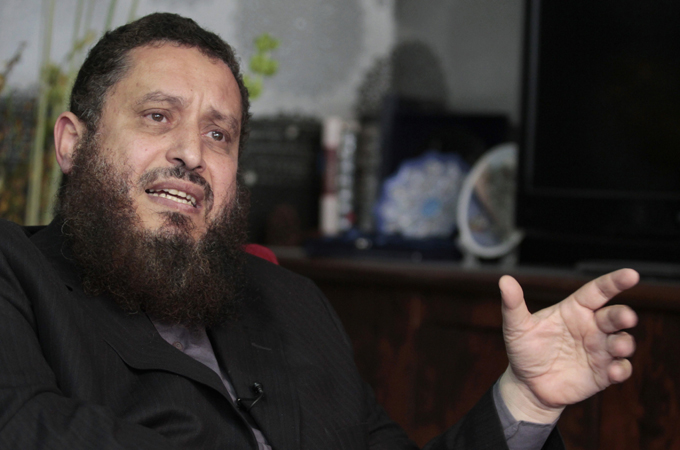Party split threatens Egypt’s Salafis
The stunning ascension of the hardline Sunni Islamists could be overshadowed by infighting over their political course.

A serious rift inside the leadership of Egypt’s Salafi political party al-Nour threatens its meteoric rise to power after the country’s first post-Hosni Mubarak election, when it came out of nowhere and grabbed 20 per cent of parliament’s seats.
Established in May 2011, the al-Nour party surprised many inside and outside of Egypt. Its strong election performance thrust al-Nour and its Salafis into political power, which the strict followers of Sunni Islam had never been previously afforded.
However, a fracture between reformers and religious hardliners during recent internal leadership elections could destroy the party in its infancy.
While Saudi Arabia is the heartland of the Salafis, they do have a strong following in other Arab countries such as Syria, Tunisia and Libya. But only in Egypt do the ultraconservative Islamists wield significant political power.
|
“Salafis are a widely misunderstood movement, often discussed synonymously with extremism, backwardness and sometimes violence. The reality of the movement is that it is fragmented, not uniform.“ – Egytian journalist Mustafa Salama |
The Arabic word salaf means “predecessors” or “ancestors”. The Salafis yearn for a return to 7th century ways of Islam. They believe in gender segregation in schools and offices, and do not believe in full political rights for minorities or women.
The religious and social base for the al-Nour party revolves around a loose network of Salafi religious scholars and their followers.
Al-Nour’s strong election showing caught off guard the less conservative Muslim Brotherhood and its Freedom and Justice Party, although it handily won both the parliamentary and presidential elections.
While the Muslim Brotherhood has pledged to gradually reform Egypt by bringing in “God’s laws” slowly, the Salafis are eager to implement sharia as soon as possible.
Egytian journalist Mustafa Salama says the Salafis are often demonised for their stringent beliefs, especially in the West.
“Salafis are a widely misunderstood movement, often discussed synonymously with extremism, backwardness and sometimes violence,” writes Salama. “The reality of the movement is that it is fragmented, not uniform, within Salafis there are various ideologies and discourses.”
If the al-Nour party plays its cards right, it could further strengthen its political power in the future, observers say.
“Their share of the vote could well increase, given that the new Brotherhood-led government is likely to have problems making good on the ambitious promises it’s made to Egyptian voters over the past year,” writes Christian Caryl, a senior fellow at the MIT Center for International Studies, in Foreign Policy magazine.
But despite al-Nour’s significant gains, an internal struggle for power is now underway that threatens its achievements, and perhaps the party’s survival.
Rising up
Al Dawah Al Salafiyah, the main Salafi movement in Egypt today, forms the backbone of the al- Nour party. It was formed in the 1970s and faced immediate persecution from the secular government.
Al-Nour’s rise after the Arab Spring has placed the Salafis at the heart of Egyptian power.
Its president, Emad Abdel Ghafour, serves as an assistant to Egpytian President Mohamed Morsi. Its representatives make up the second-largest bloc inside Egypt’s Shura council, or the upper house of parliament. And, al-Nour leaders serve on many appointed government institutions, including the human rights council and supreme council for journalism.
However, a September 15 poll to elect leaders of al-Nour’s local committees throughout the country exposed a clear crack within party’s leadership. Two camps have emerged.
 |
| Emad Abdel Ghafour, head of the Salafist al-Nour party [Reuters] |
The first is a reformist group of founders who want to democratise the party, and gain more independence from its religious mentors.
The second is a dominating faction of leaders centred around Sheikh Yasser Burhami, a prominent and powerful Salafi cleric.
Abdel Ghafour last week issued a statement on al-Nour’s Facebook page ordering a halt of ongoing party elections, citing complaints about the transparency of the process. He postponed voting until after upcoming legislative elections throughout Egypt expected next year.
Abdel Ghafour also dissolved the party’s membership committee citing “several complaints from many provinces … recording clear violations and accusations of impartiality and lack of transparency in the work on the committee”.
Containing the divide
Abdel Ghafour and other senior party leaders have played down the rift.
“The problem has been solved. It no longer exists. We hope there will be consensus in one direction,” Abdel Ghafour told Al Jazeera.
ElSayed Khalifa, Abdel Ghafour’s deputy, said the division within party leadership focused on whether internal elections should go ahead as scheduled, despite complaints that some party members had been excluded and others had not informed about the vote.
Senior al-Nour leader Ashraf Thabet – who disagreed with Abdel Ghafour’s decision to postpone the party’s internal voting – said it should proceed as planned.
“President Abdel Ghafour has our full respect and appreciation. But, the party is controlled by bylaws. We insist on institutional collective decision-making and reject decisions made by individuals,” Thabet told Al Jazeera.
The Al Dawah Al Salafiayh, based in Alexandria, was formed in the late 1970s. Sunni scholars solely wanted to spread Salafi teachings in Egypt, and avoided politics for years. But after the revolution toppled Mubarak, they felt it was time to translate their religious and social presence into a political movement and helped form al-Nour.
 |
| Al-Nour’s Nada Abo El-Maty greets supporters in Cairo [Reuters] |
But some al-Nour members are unhappy with the dominating role of the powerful scholars.
“The words of the scholars are given orders to party members,” complained Mahmoud Abbas, an al-Nour official from Alexandria who supports president Abdel Ghafour.
Abbas alleged that efforts have been underway to bring al-Nour under the strict control of Yasser Burhami, Al Dawah Al Salafiah’s strongman, who was delegated by the scholars the task of coordinating with the party since its inception.
Abbas accused Burhami’s faction of trying to design the party elections in a way that limited the number of voters and candidates.
Al-Nour has 200,000 members, but only a few thousand have come out to vote. “They wanted to control the income, so they can control the outcome,” Abbas said.
‘Excluding the best’
Yousry Hammad, an al-Nour spokesman, said the elections were “rushed by a camp who wanted to exclude some of the party’s best and most qualified members”.
“We have a reformist trend which is searching for the best candidates to lead the party, and who believes there is room for everyone inside the party. On the other hand, we have a trend who wants to exclude others,” Hammad said.
|
“Even if al-Nour collapses, Salafis will not disappear from Egypt … The question is if they are going to transform themselves into closed organizations, or are they going to stay an open trend for all its followers?“ – Mohamed Nour, al-Nour official |
Thabet, from the Burhami faction, denied the allegations and accused Abdel Ghafour’s backers of being in the dark. “They don’t attend higher committee meetings, and they don’t know what is going on,” he said.
Observers say it is too early to tell if the party’s crisis will spread from al-Nour’s leadership to its grassroots, and how it will affect its showing at Egypt’s legislative elections set for next year.
Ibrahim Arafat, a political science professor at Cairo University, told Al Jazeera party turmoil happens, but it will not weaken al-Nour “at this point”.
“They will always live a struggle between idealistic religious preaching and the practical nature of political action,” Arafat said.
If the party fails to work out its differences, it is likely the Salafis will continue to be a political force in the country.
“Even if al-Nour collapses, Salafis will not disappear from Egypt,” said party official Mohamed Nour. “Salafis are an open movement, and the question is if they are going to transform themselves into closed organizations, or are they going to stay an open trend for all its followers?”